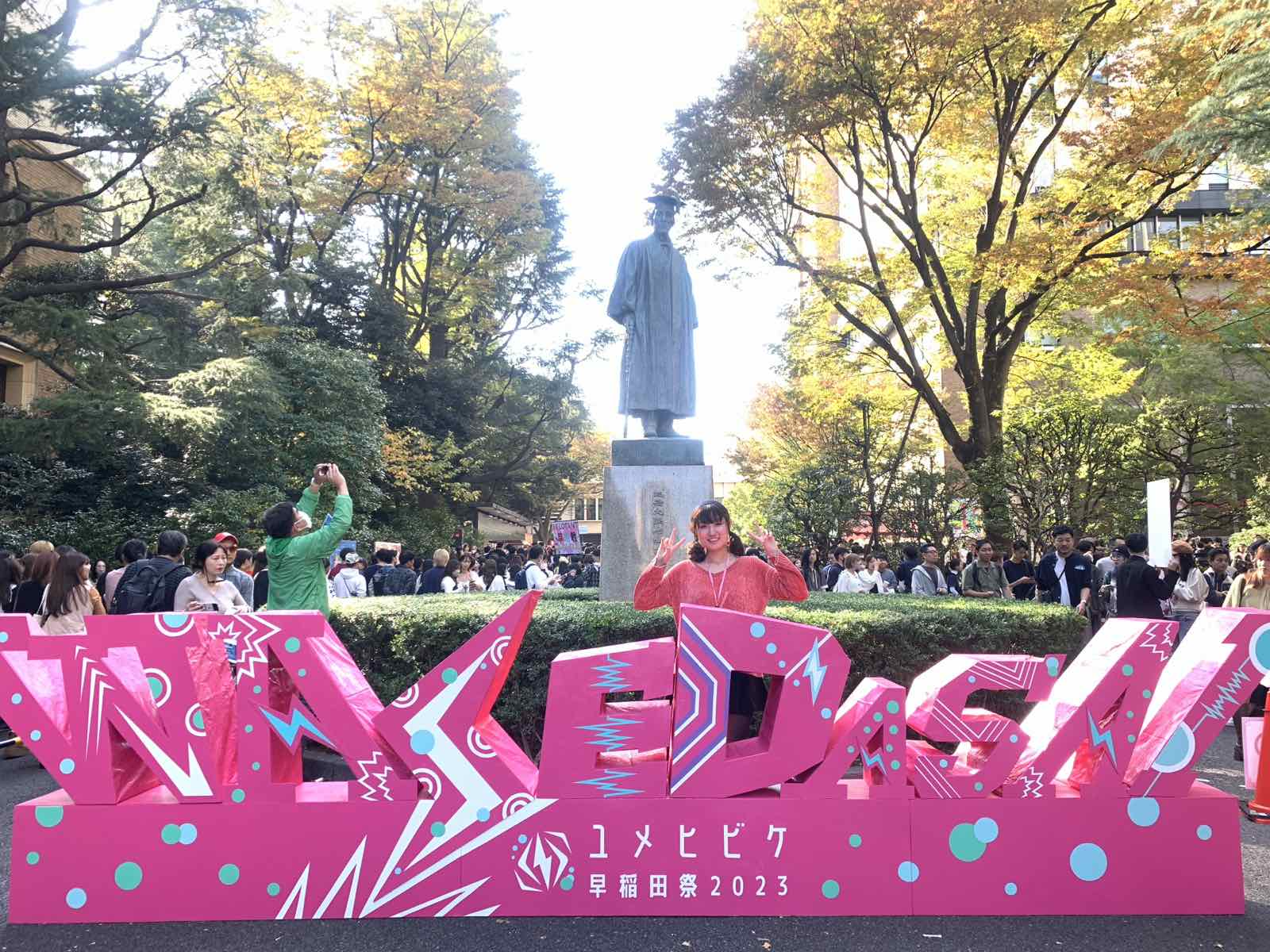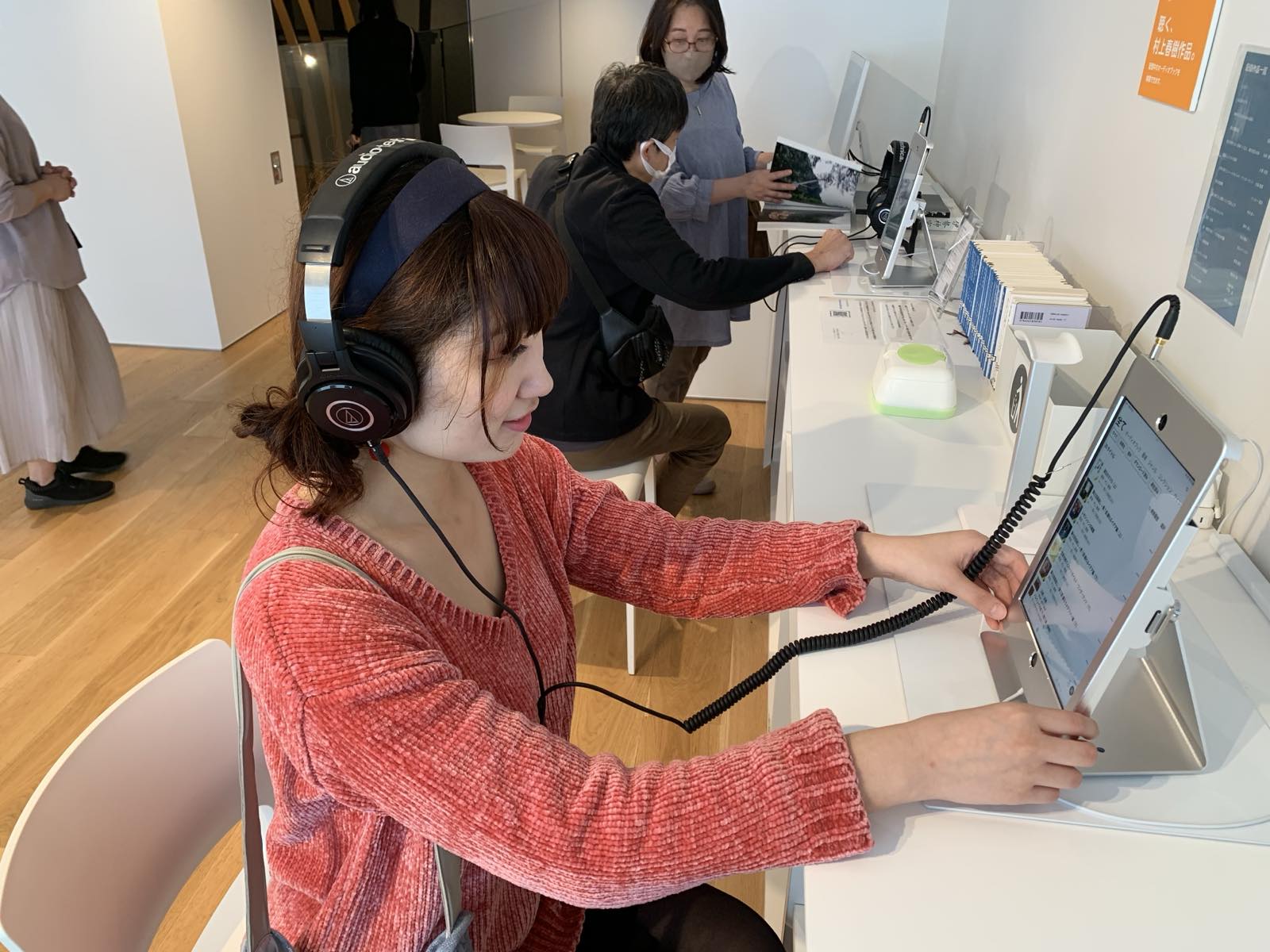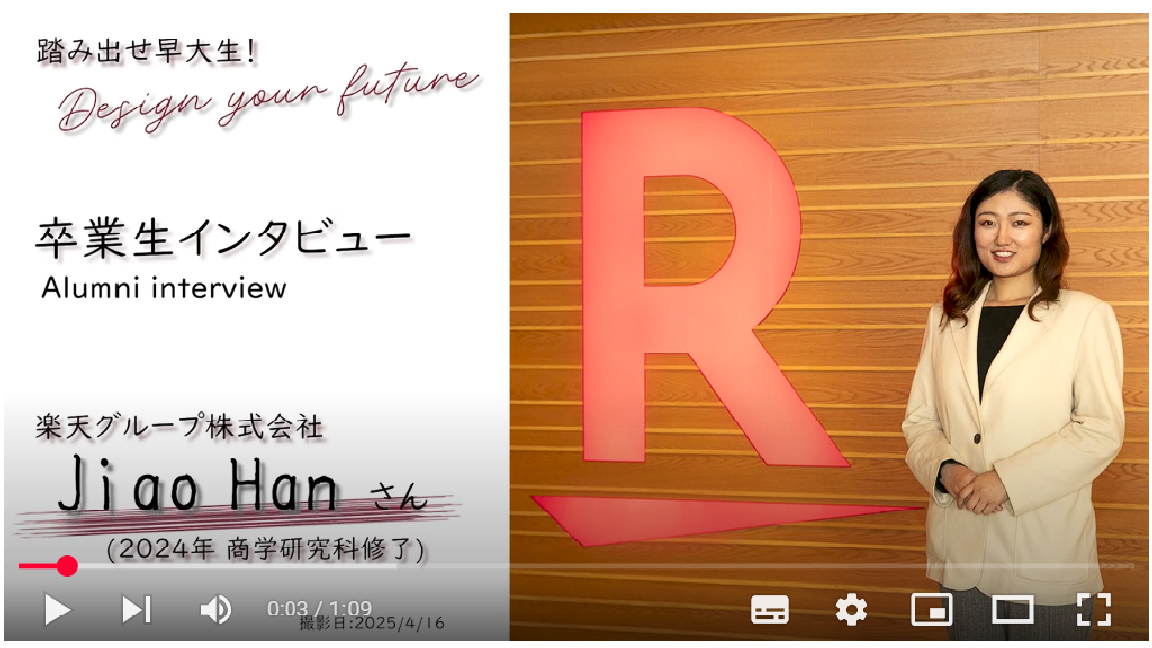Interviewees who cooperated in the interview:
Jiao Han, now at Rakuten Group, Inc., graduated from the Graduate School of Commerce in 2024.
Going to graduate school to learn specialized knowledge in the field of human resources after gaining work experience in Japan.
I majored in both mechanical engineering and Japanese at a university in China. Partly because I liked Japanese anime, I thought, “I’m studying Japanese anyways, so if I get a chance, I’d like to work in Japan.” After graduating from a Chinese university, I found a job through a Japanese company that was recruiting in China, and soon after that I went to Japan. Working as an engineer at that Japanese company, I first became aware of the company and its organization. I then decided to switch to a human resources position because I wanted to solve problems through communication, not with machines, but with people.
When I first became a recruiter at the company, I started from scratch without any knowledge of the human resources field. But looking back, I think it was a good opportunity to learn about Japanese job hunting. I developed a strong desire to continue building my career in human resources, so I enrolled in the Graduate School of Commerce at Waseda University to gain expertise in the field. In the two years leading up to graduation, I learned about data analysis related to recruitment and human resources, training systems, corporate strategy, marketing, and organizational management.
My graduate years were a very meaningful time to gain experience while switching between learning and practice. While in school, I also worked part-time as a recruiter at an AI venture company. I think I gained valuable experience in using my knowledge in the actual field while gaining it at graduate school. I also actively participated in various activities, such as working as a secretary of a general incorporated association. This experience enabled me to interact with people from a wide range of fields and industries and to gain a great deal of knowledge.
 Photo at the Waseda Festival
Photo at the Waseda Festival
Practicing to overcome the language barrier while job hunting
While many international students choose to pursue graduate school in Japan after graduating from their home country’s university, I had a somewhat irregular path, having worked in Japan for four years before attending graduate school. I started looking for a job again in Japan about six months before finishing graduate school. However, at that time, many companies had already started recruiting for the next graduation year, and my honest feeling was that I was too late. Japanese job hunting is fast, so acquiring information quickly is a substantial advantage. I recommend all students to make use of the Career Center and support systems as soon as possible. I joined the Rakuten Group through mid-career recruitment, but at that time, I used my experience at the previous company where I worked as an engineer, to search for a job using a job app, an agent, and a job recruiting site.
One of the most difficult aspects of job hunting was the SPI (aptitude test), which is used as a screening tool by several companies. All tests are conducted in Japanese. Even if you can quickly understand the test in your native language, it takes time to understand it in Japanese, and as a result, it affects the percentage of correct answers. That is why I needed to work harder than Japanese students. I had no choice but to get used to it, little by little, by solving numerous workbooks and practicing repeatedly.
Practicing Japanese is also a necessary for interview preparation. When I first came to Japan, I honestly didn’t understand the Japanese spoken by people at all. This was because the textbook I studied in China used standard Japanese, which was slightly different from the expressions used in daily conversation. For about half a year after that, I had a hard time expressing what I wanted to say well. The best way to cultivate speaking skills is to create opportunities to actually speak with Japanese people. I also tried to be proactive in talking to my colleagues when I was an engineer. Aside from formal conversation, you can also practice small talk like “What are you watching these days?” or “What kind of TV shows do you like?” Other than that, you should make good use of content on social media and apps where you can interact with Japanese people.
 At the Haruki Murakami Library
At the Haruki Murakami Library
The key factors in applying were “The company has a position I want” and “Their corporate culture resonates with me.”
In my search for companies, I placed emphasis on there being a position in the personnel field and being able to identify with the corporate culture. The Rakuten Group values diversity and inclusion and has a corporate culture in which many international employees are actively engaged. While referring to interviews of senior employees, I decided to apply for the position because I felt strongly that the corporate culture matched my values. Currently, I am mainly responsible for talent management and data analysis for personnel affairs. The skills I acquired in graduate school can be directly applied to my work, making this an ideal environment for me. The most rewarding part of my job is when the data I analyze is actually used for internal measures and problem solving. In the future, I would like to take on the challenge of using AI tools for human resources.
Additionally, whether the interview style suited me was a factor I considered when choosing a company. I felt that I was not good at interviews where the interviewer read out the questions automatically in a question and answer format, as it was difficult to showcase my individuality. In the Rakuten Group interview, I was able to convey what I wanted to present the most to the interviewer, because the interviewer carefully asked me questions such as “What kind of person am I?” and “Why did I make such a choice at that time?”
Appeal properly without hiding your individuality
I would like to tell all international students who are looking to find a job in Japan that I want them to value their individuality. In job hunting, you may experience many failures and there are many situations where you lose confidence. Even in such a situation, it is important to showcase your individuality without hiding it. Rejection doesn’t mean you were a failure, it just means you didn’t fit with the company. Remember that job hunting is not a one-sided decision by the company on whether you are a good fit for the company, but rather a decision by yourself on whether the company is a good fit for you.
You may feel uneasy about language barriers and cultural differences, but because you are an international student, you possess diverse perspectives and values that others do not. This is a great advantage. Don’t forget yourself and your uniqueness and remember to showcase them with confidence. I know there will be challenges, but I want you to believe in yourself and get through them. I’m sure you can carve out your own career with your own hands.



